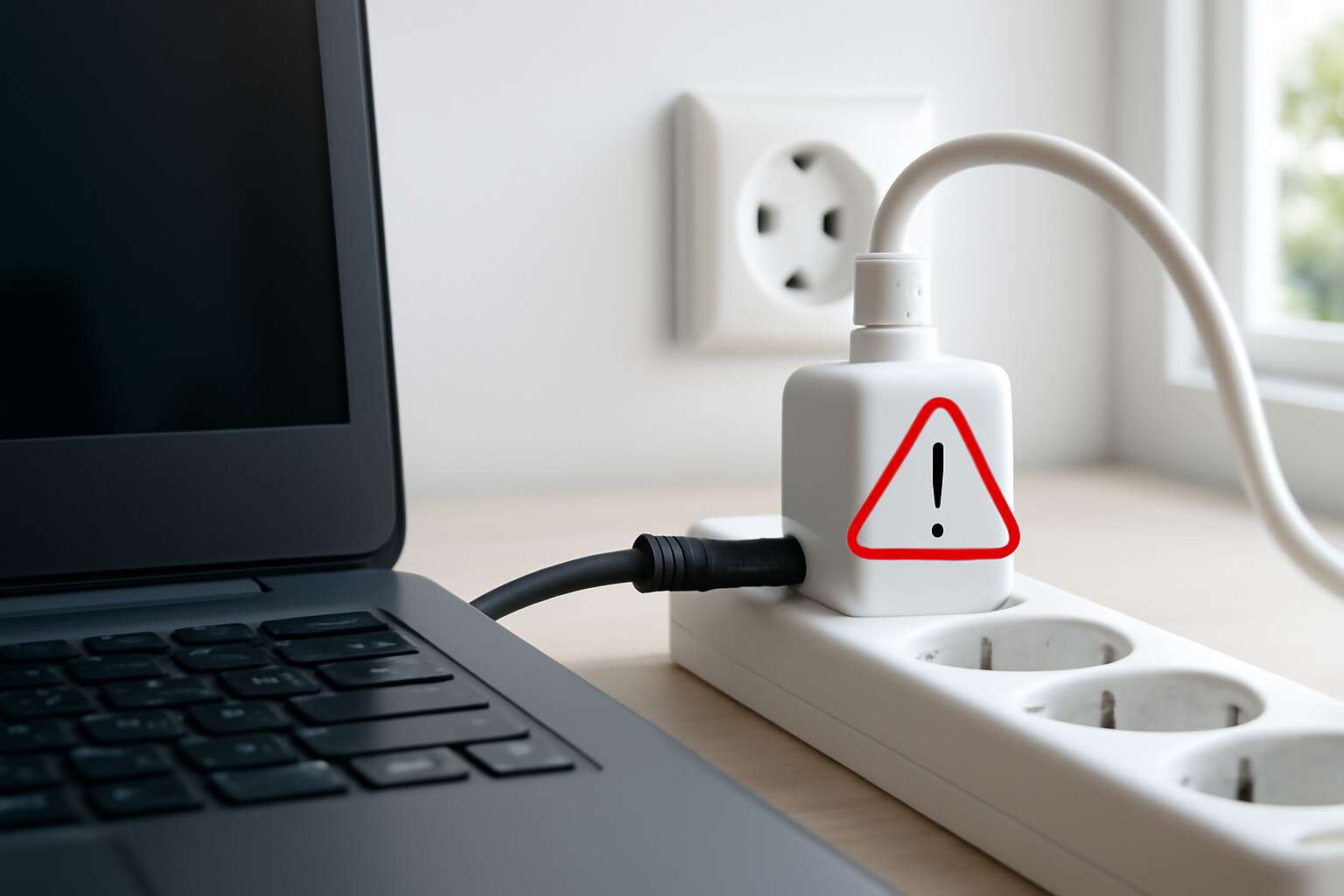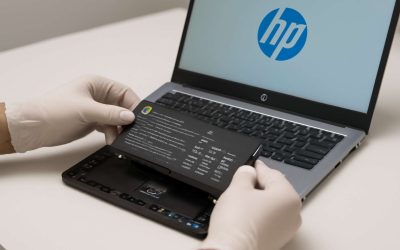Understanding Power Surges and Their Impact on Electronics
What Is a Power Surge?
In the intricate dance of electricity and technology, a power surge emerges as a formidable force—an unpredictable burst of electrical energy capable of wreaking havoc on delicate devices. Imagine a sudden lightning strike within the confines of your home’s wiring, sending ripples of excess voltage coursing through every connected gadget. This phenomenon isn’t just an ominous myth; it’s a tangible threat that can compromise the integrity of your valuable electronics.
But what exactly is a power surge? Simply put, it’s a sudden increase in voltage that exceeds the normal flow of electricity. These surges can occur due to various reasons—thunderstorms, power outages, or even the activation of high-power appliances. For those concerned about the safety of their devices, especially laptops, it’s crucial to understand whether can a power surge damage a laptop battery. The answer lies in the nature of these electrical onslaughts and how well your device is protected against them.
Common Causes of Power Surges
Understanding power surges and their impact on electronics reveals a silent threat lurking within every flicker of voltage spikes. These unexpected jolts of electrical energy can silently undermine the delicate architecture of modern devices, especially laptops. When lightning strikes or power fluctuations occur, the resulting surge can send an uncontrollable wave of excess voltage through your wiring, threatening to destabilize your equipment’s internal harmony.
Common causes of power surges include unpredictable thunderstorms, power outages, and the activation of high-power appliances like air conditioners or washing machines. These events can generate sudden voltage spikes that, if unmitigated, may compromise hardware components—raising the question: can a power surge damage a laptop battery? The answer hinges on the magnitude of the surge and the protective measures in place. While a surge can indeed harm internal circuitry, the extent to which it damages a laptop battery varies. Often, the battery’s delicate chemistry is vulnerable to such electrical onslaughts, risking reduced lifespan or complete failure.
To better grasp the risks, consider these common causes of power surges:
- Thunderstorms unleashing lightning strikes nearby
- Power grid fluctuations during outages or repairs
- Activation of high-demand appliances causing voltage spikes
How Power Surges Affect Electronic Devices
Power surges are like invisible storms, surging through the veins of our electrical systems with unpredictable ferocity. They can cause quiet chaos within electronic devices, especially laptops, which are often left vulnerable during electrical fluctuations. The question lingers: can a power surge damage a laptop battery? The answer isn’t straightforward, but understanding how surges interact with delicate components is key.
When a surge strikes, it unleashes an unrestrained wave of excess voltage that can ripple through your device’s circuitry. This sudden spike can overwhelm the internal protection mechanisms, potentially causing permanent harm. While many assume that only the motherboard or power supply is at risk, the laptop battery itself isn’t invulnerable. A significant surge can induce stress on the battery’s chemistry, leading to reduced capacity or even complete failure over time.
Particularly, high-voltage surges—whether from thunderstorms unleashing lightning or power grid fluctuations—pose a real threat. These electrical tempests can send unpredictable jolts through your wiring, raising the question: can a power surge damage a laptop battery? Absolutely, especially if your device lacks adequate surge protection. Recognizing the subtle ways electrical surges compromise batteries is crucial for safeguarding your valuable tech assets.
Laptop Batteries and Their Vulnerability to Power Surges
Components of a Laptop That Are Susceptible to Power Surges
Most people underestimate the vulnerability of their laptop batteries when faced with power fluctuations. It’s a common misconception that only the device’s internal components are at risk, but in reality, the battery itself can suffer irreversible damage due to power surges. This raises the question: can a power surge damage a laptop battery? The answer is yes, especially if the surge is strong enough to overwhelm the delicate electronic circuitry that regulates charging and discharging.
Power surges can send sudden voltage spikes through the laptop’s power system, which may not only fry the motherboard but also harm the battery. When a surge hits, the battery’s internal cells can experience voltage levels beyond their designed limits, leading to reduced capacity, swelling, or complete failure. Components such as the battery management system (BMS) are designed to protect against minor fluctuations, but extreme surges can bypass these safeguards, leaving the battery vulnerable.
Understanding which parts of a laptop are susceptible to power surges helps in appreciating the full scope of potential damage. These include:
- Battery cells and internal circuitry
- Motherboard and CPU
- Power supply units and charging ports
In essence, the resilience of your laptop’s battery depends heavily on the quality of your power source and the presence of surge protection. Without it, the risk of a power surge damaging a laptop battery becomes significantly higher—an issue that could cost far more than a simple replacement in the long run.
Battery Design and Surge Resistance
Within the delicate architecture of a laptop, the battery is often regarded as the silent powerhouse—yet it remains surprisingly vulnerable to unseen threats. When a power surge surges through the system, it can bypass even the most sophisticated safeguards designed to protect against voltage fluctuations. This raises an intriguing question: can a power surge damage a laptop battery? The answer resonates with a clear yes. The internal cells, crafted to store and release energy seamlessly, can be overwhelmed by sudden voltage spikes, leading to diminished capacity, swelling, or outright failure.
Battery design plays a critical role in how well it withstands such electrical assaults. Advanced batteries are equipped with built-in surge resistance features—such as protective circuitry and thermal management—that serve as first lines of defense. However, these measures are not infallible, especially during extreme power surges. When the electrical current exceeds the designed thresholds, it can compromise the battery’s internal circuitry and the delicate balance maintained by the battery management system (BMS). Consequently, the risk of irreversible damage increases significantly.
Understanding whether your device’s battery can endure or succumb to power surges underscores the importance of high-quality surge protection. Without it, the question—can a power surge damage a laptop battery—becomes not just theoretical but a stark reality. Ensuring a resilient power source is not merely about convenience but about safeguarding the very core of your device’s longevity and performance.
Potential Damage Pathways for Batteries During a Surge
Power surges don’t discriminate; they can strike at any moment, turning a sleek laptop into a potential catastrophe. When a sudden voltage spike occurs, it’s not just the internal circuits that face danger—your laptop battery is also at high risk. These batteries, though designed with some surge resistance, remain vulnerable to extreme electrical events. The question remains: can a power surge damage a laptop battery? The answer is a definitive yes. The internal cells can absorb some impact, but overwhelming surges bypass protective barriers and cause irreversible harm, leading to reduced capacity or swelling.
Potential damage pathways include internal short circuits, thermal runaway, and degradation of the battery management system (BMS). When a surge hits, it can overload the delicate balance within the battery’s architecture, causing internal damage that’s often invisible until performance plummets. The severity depends on the surge’s magnitude, but even minor spikes can weaken the battery’s lifespan over time. Once compromised, the battery may no longer hold charge, posing safety risks or rendering the device useless. So, the next time someone asks, can a power surge damage a laptop battery, the answer is clear: yes, it can—and often does.
Can Power Surges Damage a Laptop Battery?
Direct Damage to Battery Cells
Power surges can cause more than just temporary disruptions—they have the potential to cause lasting harm to your devices. Many wonder, can a power surge damage a laptop battery? The answer is yes, if the surge is severe enough. When a sudden spike in voltage occurs, it can overload the delicate internal components of the battery, leading to irreversible damage.
Laptop batteries are designed with some level of surge resistance, but this isn’t foolproof. Direct exposure to a high-voltage surge can cause the battery cells to overheat, swell, or even fail prematurely. In some cases, this damage isn’t immediately visible but can manifest as reduced battery life or sudden power loss over time.
Understanding the risks helps emphasize the importance of surge protection. Even a minor power surge can stress the battery, making it more vulnerable to failure. So, the question remains: can a power surge damage a laptop battery? Absolutely—if the surge is strong enough, it can compromise the integrity of your battery cells.
Impact on Battery Management System (BMS)
Power surges don’t just threaten the hardware you see—they can stealthily undermine the very brain of your device: the Battery Management System (BMS). This sophisticated control unit is responsible for monitoring and regulating the health of your laptop’s battery. When a sudden voltage spike occurs, it can send shockwaves through the BMS, disrupting its delicate balance. This disruption can cause the system to misjudge charge levels or fail to protect the battery from overcharging, ultimately compromising its longevity.
In some cases, the damage to the BMS may not be immediately apparent. Instead, it manifests gradually as reduced battery capacity or erratic charging behavior. Think of the BMS as a vigilant guardian—power surges can weaken its resolve, making your laptop’s battery more vulnerable to future failures.
- Overloading the BMS’s circuitry
- Corrosion or physical damage caused by voltage spikes
- Degradation of protective components within the BMS
By understanding the impact a power surge can have on the BMS, it’s clear that the question “can a power surge damage a laptop battery?” extends beyond just the cells—damage to the system that manages those cells can be just as detrimental, if not more so. The resilience of the BMS is crucial in safeguarding your device’s power source, emphasizing the importance of effective surge protection measures.
Signs of Surge-Induced Battery Damage
Power surges are like sudden thunderstorms in the world of electronics—bright, unpredictable, and potentially destructive. But can a power surge damage a laptop battery? The answer isn’t always straightforward. While many focus on the visible damage to hardware, the hidden threat lies within the battery management system (BMS), which can be silently compromised during these voltage spikes.
Signs of surge-induced battery damage can be subtle yet alarming. You might notice your laptop’s battery draining faster than usual, or it may refuse to charge beyond a certain point. In some cases, the device may experience sudden shutdowns or display erratic charging behavior. These symptoms often point to internal damage caused by power surges, which can weaken the delicate circuitry inside the battery or disrupt the BMS’s ability to monitor and regulate power.
Understanding whether a power surge can damage a laptop battery involves recognizing the vulnerabilities within the device. Damage isn’t always immediate; it can build gradually, eroding the battery’s capacity and reliability over time. Keep an eye out for:
- Rapid and unexplained battery drain
- Inconsistent charging patterns
- Overheating during charging cycles
All these signs highlight the subtle yet significant impact of power surges—reminding us that safeguarding your device’s power source requires more than just a good charger. It’s about understanding the vulnerabilities and the importance of protective measures to keep your laptop’s battery healthy in a world full of electrical chaos.
Preventive Measures to Protect Laptop Batteries from Power Surges
Using Surge Protectors and Uninterruptible Power Supplies (UPS)
Power surges are more common than many realize, and their impact can be surprisingly severe. Protecting your laptop battery from potential damage is essential, especially since a power surge can damage a laptop battery if left unprotected. Using surge protectors or uninterruptible power supplies (UPS) is a simple yet effective way to safeguard your device.
A quality surge protector acts as a barrier, diverting excess voltage away from your laptop during a surge. It provides peace of mind, knowing that even unexpected electrical spikes won’t reach sensitive components like the battery. For added security, a UPS offers backup power and surge suppression in one unit. It stabilizes fluctuating power levels and prevents sudden voltage spikes from reaching your laptop.
To maximize protection, consider the following:
- Always plug your laptop charger into a surge protector or UPS.
- Choose a surge protector with sufficient joule ratings to handle power spikes in South Africa.
- Regularly inspect your surge protection devices for wear and tear.
Investing in these preventive measures ensures your laptop battery remains safe and functional, even during unexpected electrical events.
Proper Charging Practices and Power Management
Power surges can hit unexpectedly, and their silent threat lurks in the shadows—ready to strike your laptop’s core. The question remains: can a power surge damage a laptop battery? The answer is a resounding yes. While many focus on immediate hardware failure, the insidious damage to your battery’s longevity often goes unnoticed until it’s too late.
Proper charging practices are your first line of defense. Always plug your laptop charger into a surge protector or UPS—never directly into a wall socket. This simple habit creates a barrier against sudden voltage spikes that could otherwise wreak havoc on your battery’s delicate chemistry. Additionally, avoid charging your device during thunderstorms or electrical storms, when power surges are most prevalent. Power management settings also play a crucial role; by setting your laptop to operate within safe voltage ranges, you reduce the risk of surge-related damage.
To deepen your protection, consider the following:
- Use surge protectors with high joule ratings to handle South Africa’s frequent power fluctuations.
- Implement smart power management settings that prevent overcharging and overheating.
- Regularly inspect and replace aging surge protection devices to ensure optimal performance.
By adopting these preventive measures, you bolster your defenses against the lurking threat—because in the battle against power surges, knowledge is your most potent weapon. Remember, can a power surge damage a laptop battery? Absolutely, but with vigilance and proper care, you can keep your device—and its battery—safe from harm’s reach.
Installing Surge Protection Devices for Wall Outlets
Installing surge protection devices for wall outlets is an essential step in safeguarding your laptop battery from unexpected power fluctuations. In South Africa, where electrical instability is a common concern, this preventative measure becomes even more critical. A high-quality surge protector acts as a sturdy barrier, absorbing excess voltage and preventing it from reaching your device’s delicate components. When choosing one, look for models with high joule ratings, which can handle the frequent power surges typical in the region.
By investing in reliable surge protection, you not only shield your laptop battery from potential damage but also extend the overall lifespan of your device. It’s a simple yet effective way to ensure your electronics are resilient against the unpredictable nature of local power supplies. Remember, a surge protector isn’t just an accessory but a vital safeguard—because the question remains: can a power surge damage a laptop battery? The answer is yes, and prevention is your best defense.
Regular Battery and Power System Maintenance
Protecting your laptop battery from power surges isn’t just about preventing inconvenience; it’s about safeguarding the heartbeat of your daily work and connection. Regular maintenance of your battery and power system can significantly reduce the risk of damage caused by unexpected electrical fluctuations. Simple habits, such as ensuring your charger and power cords are in good condition, help maintain the integrity of your battery’s internal structure. In regions like South Africa, where electrical instability is a common challenge, these precautions become even more essential.
Implementing routine checks can help identify early signs of wear or potential issues. For example, inspecting your battery’s health status through built-in diagnostics or monitoring software provides insight into its condition. Additionally, calibrating your battery periodically ensures accurate readings and optimal performance. Remember, a well-maintained power system acts as a fortress, making it less likely that a power surge will cause lasting damage to your laptop battery.
Incorporating these preventive measures not only prolongs the lifespan of your device but also grants peace of mind. After all, the question remains: can a power surge damage a laptop battery? The answer is yes, but diligent maintenance and proactive care serve as your best line of defense.
What to Do If You Suspect Surge Damage to Your Laptop Battery
Symptoms Indicating Possible Damage
If you notice your laptop behaving strangely after a sudden blackout or a flickering power outlet, it’s time to investigate. Symptoms indicating possible damage from a power surge can range from sudden battery drain to erratic charging behavior. These subtle signs often go unnoticed until they escalate into more serious problems. Remember, can a power surge damage a laptop battery? Absolutely — and sometimes the damage isn’t immediately visible.
One of the key indicators is a rapid decline in battery performance, even after a full charge. You might also see the device shutting down unexpectedly or experiencing difficulty holding a charge. In some cases, the battery may become excessively hot or swell, which is a telltale sign of internal damage. If you suspect surge damage, it’s crucial to act quickly. Ignoring these symptoms can lead to complete battery failure or even safety hazards. Identifying these signs early can save you from costly repairs and data loss in the future.
Steps to Diagnose the Damage
When suspicion whispers that your laptop has fallen victim to a sudden electrical assault, diagnosing the extent of the damage becomes a delicate art. The first step is to scrutinize the battery’s behavior—does it drain faster than usual, or does it refuse to hold a charge? These subtle clues can be the first indication that can a power surge damage a laptop battery.
To delve deeper, consider performing a simple yet revealing test. Disconnect the laptop from all power sources and run it solely on battery. If it shuts down unexpectedly or the battery percentage drops precipitously, these are ominous signs of internal harm. For a more thorough diagnosis, you might:
- Check for abnormal heat or swelling.
- Observe if the device exhibits erratic charging patterns.
- Use specialized software to assess battery health and capacity.
Understanding these signals can often illuminate whether the damage is superficial or a more insidious internal decay—prompting necessary repairs before the darkness of complete failure takes hold.
When to Seek Professional Repairs or Replacement
If you suspect that a power surge has compromised your laptop battery, acting swiftly is essential. The first step is to stop using the device immediately to prevent further internal damage. Next, perform a careful inspection for signs such as swelling, overheating, or erratic charging behavior. Recognize that these symptoms could be linked to the unavoidable question: can a power surge damage a laptop battery?
When symptoms persist or worsen, seeking professional repair becomes necessary. An expert can run comprehensive diagnostics to determine if the damage is superficial or has penetrated deeper into the battery’s core components. Often, it’s a choice between replacing the battery or the entire device.
In some cases, a simple test can reveal the severity of the damage: disconnect the laptop from power, run solely on battery, and monitor for unexpected shutdowns or rapid charge loss. If these signs emerge, it’s a clear indication that the damage runs deeper than surface level.
Myths and Facts About Power Surges and Laptop Batteries
Common Misconceptions
Many believe that a simple power surge can’t harm a laptop battery, but this is a dangerous misconception. The truth is, even a minor surge can have lasting effects on your device’s core components. The myth that batteries are immune to power surges often leaves users unprepared for potential damage, risking costly repairs or replacements.
While some assume that modern batteries are inherently surge-resistant, the reality is more nuanced. A power surge can cause immediate damage or weaken the battery over time, leading to reduced capacity or sudden failure. It’s essential to understand that the question, “can a power surge damage a laptop battery,” isn’t just theoretical—it’s a real concern that demands attention. Proper surge protection and vigilant maintenance are your best defenses against these invisible threats lurking in your power supply.
Accurate Information Based on Electrical Engineering Principles
Misconceptions about power surges often lead users to underestimate the silent threat they pose to their laptops. One prevalent myth is that modern batteries are entirely immune to the effects of a power surge, but this is far from the truth. Electrical principles reveal that even minor surges can compromise battery integrity, subtly eroding capacity or causing unpredictable failures over time.
Understanding the distinction between myth and fact is crucial. Power surges can damage a laptop battery through various pathways, such as creating voltage spikes that overwhelm internal components. The real question remains: can a power surge damage a laptop battery? The answer is yes—if the surge is significant enough or if protective measures are absent.
- Inadequate surge protection can leave batteries vulnerable.
- Repeated small surges gradually weaken internal battery chemistry.
- Surge-induced damage may not be immediately visible but can lead to long-term performance decline.
Electrical engineering principles confirm that no component, including the battery, is entirely exempt from surge-related risks. Recognizing these truths helps in adopting proper safeguards, ensuring that the beauty of a well-maintained device isn’t marred by avoidable damage. After all, safeguarding the core of your device is a testament to respecting its delicate balance between power and fragility.




0 Comments